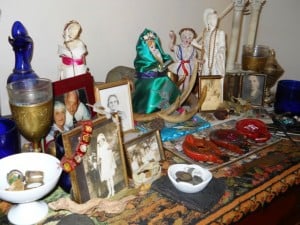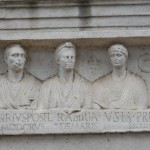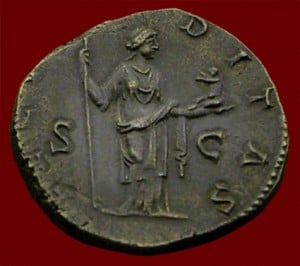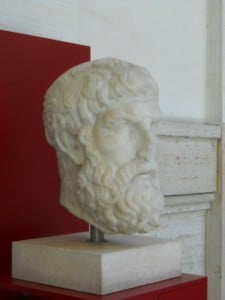Today, sixteen days before the kalends of Maius, marks the anniversary of when Ulysses and his son Telemachus slew the suitors of Penelope. It took place during a solar eclipse that occurred around noon that day. Based on such details of information found in Homer, with reference to specific astronomical events, the year and date of Ulysses return to Ithica can be placed to six days prior. Homer then alludes to an eclipse that would have been visible in the area of the Ionaian Sea.
Calculating a date from this information then offers 16 April 1178 BCE, which also corresponds to the date of ten years earlier, in1189 BCE, as the year that Troy fell. Greek authors from Heraclitus to Plutarch took note of the eclipse in Homer’s words. The calculation on when this eclipse took place was first made in the 1920’s and was widely accepted. More recently, June 2008, Constantino Baikouzis of the Astronomical Observatory, La Plata, Argentina, and Marcelo Magnasco, head of mathematical physics at Rockefeller University, New York, confirmed the date.
Interesting is that this eclipse fell on the day after the ides of April, since the days following the kalends, the nones and the ides of each month is called a dies ater, a dark day. Altar fires are not to be lit, and thus neither Janus nor Jupiter invoked, which limits certain activities. One is not to begin any enterprise nor begin a journey on dies ateri since one would normally invoke the Gods to favor new beginnings. One cannot offer sacrifice at the tombs of ancestors, as those ceremonies too would involve calling Janus and Jupiter to attend, and the celestial Gods are not to be invoked aloud on these days.
However, fires that were previously lit may be maintained, and thus the hearth of a Roman house would still be available for our daily prayers for the Lares. Any ventures begun before a dies ater can be continued, as would any necessary work or travel. I suppose one could also conclude some venture on a dies ater, as Ulysses did over three thousand years ago this day. In his Epistle to Lucullus (10.5), our Stoic Seneca enjoins us,
Live with men as though a God were watching;
Speak with a God as though men were listening.”
Then are there certain deeds that are necessary for us to perform when the Gods should not be invoked since They should not look upon these? And thus the sun darkened as They turned away, not to look upon Ulysses while Necessity required that he cleanse his house?
Most people will never have to face such situations, but millions have before and shall again, whenever natural disasters strike and man-made disasters require one to choose to survive. Then there is combat, when one faces choices of what to do or what not to do, what to witness, and when to avert one’s eyes. There are times when our soul darkens, too, eclipsed as it averts its gaze and the umbracious gods exact their due. It is a long journey back into the light of day, a journey that can only begin in the depths of shadows in the night.
Ulysses returned a middle-aged man, a hardened and seasoned soldier; Telemachus was yet a young man, inexperienced except in his desires for vengence. I was once a soldier, nearly forty years ago now, an analyst in Army Intelligence during the Cold War, a misnomer, and during the Viet Nam War, through the massacre of the Israeli athletes at the Munich Olympics in ’72 and the subsequent Yom Kippur War of Oct. ’73, ‘observing’ on the Golan Heights east of Quneitra while my friend in the Golani Brigade had to resort to throwing stones to keep the Syrians at bey, and then during other affairs in Central and South America, journeys at night in sealed planes and vehicles into Columbia during the Christmas earthquake to provide humanitarian aid, while CIA operatives ran about in unmarked white vehicles. Friends mutilated, one man tossed into a tree above where I sat, his body torn in half, still living and begging for my help as his guts dripped into my can of cold beans – I still won’t eat cold beans after all these years. And a field of pulverized remains, the result of an airstrike, gathering up left feet in a pile so others might proudly report an accurate count of enemy dead as if a trophy to hang on their walls. Well, a few things witnessed in years past, and some sleepless nights afterward. Memories fade in time.
Then, my youngest son went off to Iraq. Friends of another son went off to the army as well. A friend’s son in training to leave for Iraq, in-laws called up from the Guard, newscasts as the war progressed, and the past all comes back. The same happened with my father, a Marine Raider in WW II, who wept when my brother went off to Hue. I suppose the same among my many uncles, too, who served during the Korean War, one marked by frostbite he received at the Chosin Reservoir. It is not so much the past that haunts as it is what awaits our children in the future now that they must face their own journeys back from an eclipse of the soul. When in the dark night of the soul one feels alone and abandoned even by the Gods, the eclipse of the soul is the stark vision of the depths within that we hide even from ourself. Ulysses can avert the cyclops and sirens of his nightmare past; he cannot avert what gods of darkness await Telemachus when he too must face himself.















